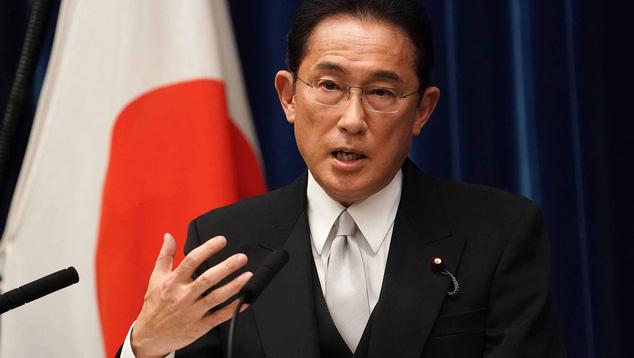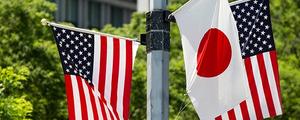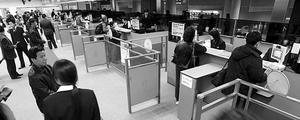Story Highlights
- 66% of Japanese adults say it's a bad time to find a job
- 47% say their local economies are getting worse
- 63% lack confidence in their national government
WASHINGTON, D.C. -- If Japan's new Prime Minister, Fumio Kishida, hopes to win over voters ahead of elections at the end of the month, he will need to convince them that he can heal his country's pandemic-battered economy. Before Kishida took office on Monday, 66% of Japanese adults said it was a bad time to find a job where they lived, and nearly half (47%) said economic conditions were getting worse in their local area.
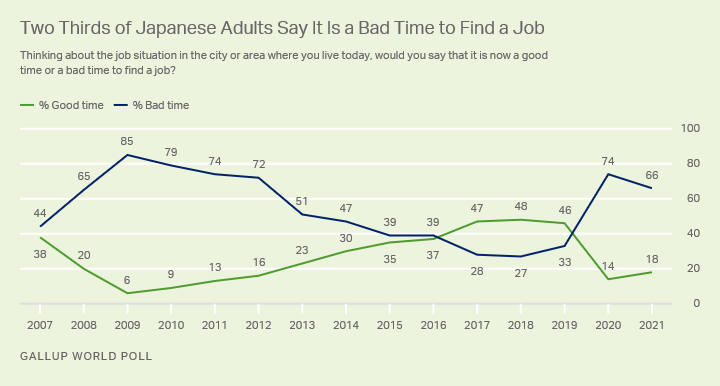
Line graph. Japanese adults' perceptions that it is a good or bad time to find a job where they live. Currently, 66% of the Japanese public say it is a bad time to find a job, while 18% report it is a good time. This is compared with 46% who said it was a good time to find a job and 33% who indicated it was a bad time in 2019.
These latest data come from Gallup's World Poll survey conducted in mid-June through mid-August, as Japan continued to struggle to contain the COVID-19 pandemic. Japan had already been contending with slow economic growth for years before the pandemic and suffered some of worst declines during it.
The pessimism that Japanese adults currently feel about their job market reflects that situation and is a drastic departure from the cautious optimism they expressed in the years immediately preceding the pandemic. In 2019, nearly half (46%) of Japanese adults said it was a good time to find a job where they lived, while 33% said it was a bad time. The Japanese public's views on their local job markets darkened during the pandemic, with 14% saying it was a good time to find a job and 74% reporting it was a bad time in 2020.
The current 18% who now say it is a good time to find a job and the 66% indicating it is a bad time is only a modest improvement and well below levels of most of the past decade. Japanese pessimism on local job markets reflects that in 2020, the country's economy had the lowest ratio of available jobs to applicants in nearly 50 years.
Japanese Adults Cynical About the Direction of Their Local Economy
Although their outlook on the economy has improved somewhat since 2020, when the majority saw it getting worse, Japanese adults are still not positive about where it is headed. Nearly half of Japanese adults (47%) in 2021 say economic conditions in their local areas are getting worse, while 29% say they are getting better. This remains down from 2019, when 37% Japanese adults said their local economies were improving, and 34% reported their local economies were getting worse.
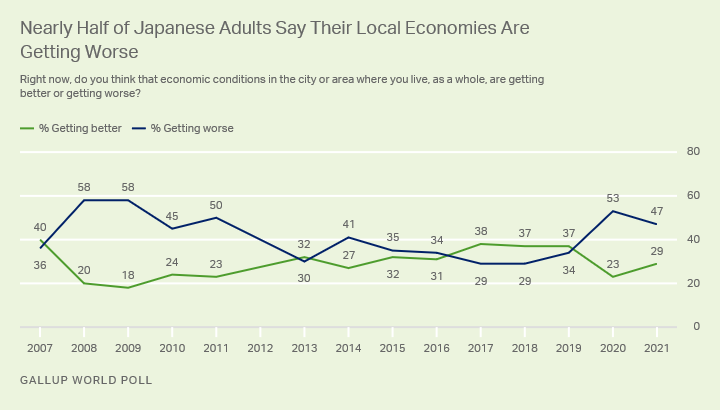
Line graph. Japanese adults' perceptions of the trajectories of their local economies. Currently, 47% of the Japanese adults say their local economies are getting worse, while 29% report they are getting better. This is compared with 34% who said they were getting worse and 37% who indicated they were getting better in 2019.
Most Japanese Adults Lack Confidence in Their National Government
In addition to the economic woes facing the country, Kishida also faces a crisis of confidence in the country's government. Before he took office, 29% of Japanese adults said they had confidence in their government, while 63% said they did not. Current levels of confidence in the government are at their lowest levels since 2012.
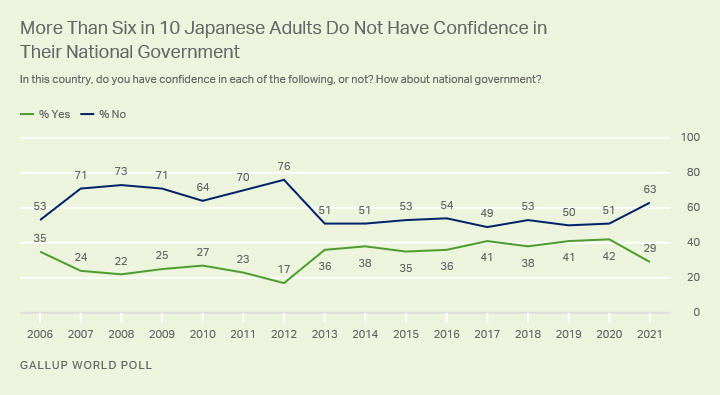
Line graph. The percentage of Japanese adults who have confidence in their country's national government. Currently, 63% lack confidence, while 29% have confidence. This is compared with 41% who said they had confidence and 50% who did not in 2019.
Confidence in the Japanese national government had held steady during the heights of the COVID-19 pandemic. In 2020, 42% of the Japanese public said they had confidence in the national government, and 51% reported they did not, compared with 41% who had confidence in the government and 50% who did not before the pandemic in 2019. Confidence in the country's government may have been dinged, at least in part, by a perceived slow rollout of COVID-19 vaccinations in the country.
Bottom Line
Kishida comes to office facing serious challenges to the country's economy, which are compounded by people's lack of confidence in the Japanese government. These would be daunting issues for any leader and are only made more pressing by parliamentary elections, set for Oct. 31. This gives Kishida little time to make progress on these daunting issues, particularly as the pandemic continues around the globe.
Japanese politics has long been described as a struggle between the various factions of Kishida's Liberal Democratic Party (LDP). The party has been the predominant force in governing Japan since the end of the Second World War, having been the ruling party in Japan for 90% of the time since its inception in 1955. The LDP has only been out of power between 1993-1994 and 2009-2012. However, given the country's economic woes, low confidence in the government and the short time to turn things around before the election, political change may be on the horizon for Japan.
To stay up to date with the latest Gallup News insights and updates, follow us on Twitter.
For complete methodology and specific survey dates, please review Gallup's Country Data Set details.
Learn more about how the Gallup World Poll works.
